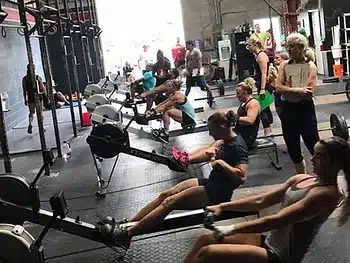
Note: This week’s blog post is once again written by Jeremy Jones of Thrivestry. Jeremy is the guy who writes our programming. This is Part Two of his blog on becoming a CrossFit competitor. Today he talks about competition programming. Shoot us an email if you’re interested in learning more about this programming.
Click here to read Part One of this post.
Gym Programming and Competition Programming
In Part 1, we talked about the beginning steps to start shaping your training around entering competitions. We covered “Phase 1” or the “Novice” category of the Competition Continuum:
- Phase 0: Coming to class consistently and just learning the movements.
- Phase 1 aka “Novice Competitor”: Doing the majority of the workouts at the Performance level and doing a bit of extra work.
- Phase 2 aka “Amateur”: Doing competition programming in a group while being coached
- Phase 3 aka “Semi Pro”: Still training with others and getting coached, but getting some custom coaching/programming
- Phase 4 aka “Pro”: Getting custom programming and coaching, possibly training alone often
To review, here was the summary of what you should be doing at Phase 1 before you are ready to move up to Phase 2:
“Novice Competitor” Checklist
- Come to class early to work on weaknesses/skills.
- Always focus on form and efficiency. Take the ‘skill practice’ seriously to get those nailed down.
- Lift heavy, and make sure you are getting the lifts in each week.
- Do the workout at the Performance level and scale up the metcon regularly (when appropriate).
- Stay after to work on more skills (and/or do the cash out/hypertrophy).
- Stay active on ‘off’ days with easy activity and skill work.
- Come to the gym 5-6 times per week.
Today we are going to go over Phase 2 for those people who are working toward becoming “Amateur Competitors”!
At this stage, you should be doing all (or almost all) of the class workouts at the “Rx” level, and scaling up to Rx+ regularly. The Rx+ versions of the workout are usually what the competition programming has lined up (in addition to a bunch of other stuff). Getting familiar with these versions of the metcons will help prepare you for doing some specialized programming!
Side Note: Masters 45 and up usually don’t need to worry too much about the scale ups when it comes to loads. Obviously if you can do the heavier loads, do them, but it isn’t a requirement! The things to pay attention to are the higher skill movements that come up (things like muscle ups and handstand walking). If you can’t do these movements, make sure you are working on them multiple times per week, so you’ll have them down as soon as possible!
Competition Programming
One of the benefits of doing Thrivestry is that we have two tracks of programming. The general class programming and the Competition programming. By having them separate, we can keep the regular programming fun and focused on general fitness without your training feeling like a second job, and it also allows the competition programming to be a lot more focused on the “sport” version of fitness we see in local competition and CrossFit Comps!
That said, these two tracks are not completely separate. We ‘overlap’ a lot of the training so that you do not have to be completely separated from your friends still doing regular class and you can still go to classes to get coached!
Before You Start
If you haven’t done it yet, make sure you talk to your coach about doing the Comp stuff. It is more than likely that they know your intentions because you have been doing the extra stuff during Phase 1. Hopefully, you have already done lots of one on one work with them and some specialty clinics to work on specific skills.
Do not assume that you are ready for competition stuff just because you are doing well on the class workouts! Most gyms have the competition stuff as more of an ‘invite only’ type of thing. Many gyms also have standards you have to meet, a personal training requirement, and/or an upgrade to your membership.
The extra cost is to help cover the fact that you are going to be using the gym and equipment A LOT more than the regular person (like 3 times more), and you’ll also need some extra attention from coaches when working on those advanced skills. Those funds will help cover the cost of a special class (or two) for competitors as well as help fund some of the extra support when you enter competitions (showing up to cheer you on and bring supplies, extra coaching before a competition, etc.)
What You Are Signing Up For
The Comp program has separate lifts and progressions from the class as well as additional skill work and aerobic work. These things are programmed in 6 week cycles like the gym’s strength cycles, and many times the class will be doing one of the lifts you’ll be doing, but your training will require a lot of “Open Gym” time.
Generally, these training sessions take about 2 hours to complete, 5 days per week. Some people have the ability to split it up into multiple sessions per day, but it isn’t required.
Again, it is important that you talk to your coach ahead of time, so you’ll know when you will be able to train. Depending on your gym’s size, you probably won’t be able to train on your own during the really busy times because you are going to need quite a bit of equipment. Just because “COMP PROGRAMMING!!!”, it doesn’t mean that you will be able to take over the gym and displace the classes.
You may not have to, but be prepared to come in on the ‘off peak’ hours (late mornings, afternoons, before 5pm, after 7pm and weekends) at least some of the time.
Not So Lonely
This doesn’t mean that you’ll be all by your lonesome! Remember that I mentioned that the Comp programming does have some overlap when it comes to metcons and lifts?
The best thing you can do is look at the programming and see when the metcon overlaps with what the rest of the gym is doing (it says so in the programming). Usually this is the case about 80-90% of the time… Then… come to class!
“Wait! I thought I was doing separate programming?!”
That is the beauty of having the metcons overlap. You will be able to come into the gym early and get a lot of your stuff done before the class (or after in some cases).
The benefit of coming to class is that you’ll have a coach watching you and giving you feedback. You’ll also have other people to workout with and push you (even if they aren’t doing the scale ups like you). There is also the fact that you’ll still be participating in the community (more on that later).
Your Plan
Here is a typical plan for someone doing the Comp Programming coming to regular class:
- Show up to the gym 1 to 1.5 hours before going to the class.
- Warm up and mobilize. Get through the auxiliary, grease the groove, and most (if not all) of the lifts and gymnastics progressions.
- Make sure you let the coach know that you’ll be going to class (ahead of time preferably).
- Go to class. Have fun. Participate.
- If they are doing a lift that isn’t one that the competition programming is focused on, “save” one of your lifts and do it during the class. For example, if the class is doing back squats, you may be doing front squats.
- During the time when they are coaching the basics, do some extra mobility while paying attention, or work on doing that movement more efficiently (quietly so you do not disrupt the class). Occasionally, you might ask the coach if it is okay if you do a different skill (one from the Comp stuff).
- If the Comp programming metcon has extra stuff, like a ‘buy in’ before or ‘bonus’ after, make sure you talk to the coach so they plan for that.
- Log your stuff on the whiteboard or whatever, but don’t make a big deal about it (people already know that you are ‘more fit’ than them, don’t rub their noses in it).
- Stick around after class and talk to people. Finish up anything else that you might need to work on.
You may only get to do this 2 or 3 days per week, but definitely do it at least once per week! MINIMUM! It is important that you stay part of the community, get some coaching, and train with some friends!
Total Volume and Ramping Up
The Comp programming will take some time to adjust to. Usually it takes about 3-6 months for your body to get ‘used’ to the volume (assuming you are eating well and sleeping well). There is a LOT more stuff than the regular classes on a weekly basis (especially lifting).
It is best that at the beginning that you start conservatively. Keep the loads and progressions extra ‘easy’ the first couple cycles so you don’t get completely beat down. It is okay to skip a few things, at first, but the program really works best when you are doing everything.
It is planned that way. The lifts build on one another week to week. The skill work sets you up for the next cycle. The Monostructural/aerobic work aids in recovery and builds more capacity.
If you do 80% of the program, you are only going to get 20% of the results.
The program is set up to be 3 days on, 1 day ‘off’, then 2 days on, 1 day ‘off’. It is posted as training on Mon, Tue, Wed, then Fri, Sat, but it could be shifted to fit your schedule if those days don’t work.
We send the programming out in week long chunks with each day’s workload spread out over an entire page. We’ve found that it is best to print out the programming so you can take notes and check things off the list. You can also use your phone to ‘mark up’ the file if you are tech savvy (use a ‘pdf viewer’).
The goal is to get everything checked off the list, and to have notes to refer back to later. You can use these notes to see how far you have come and/or to talk to your coach about your training!
Week at A Glance: Sept. 17-22
Monday – September 17, 2018
Context: Competition – Call out your target score before the workout and try to beat it
Strength: 3×4 then 3×3 power clean – 4 of 11 (3 sets of 4 reps then 3 sets of 3 reps, same weight across, 70-80% of max)
Super Set: 6×5 single arm ring row (6 sets of 5 reps on each side, same challenge with all sets)
Metcon: “Hall of Mirrors”
5 rounds for time
35 double unders (scaled: 4 single unders, 1 double under attempt, 7 sets)
200m run
Scaling Guide: 6:30 – 13 minutes, about 2 min per round.
Rx+: none
Compare to: April 19, 2018
Tuesday – September 18, 2018
Context: Practice – strict means strict, and full body tension
Strength: 3-3-3-3-3-3-3 front squat (7 sets of 3 reps, working up to a ‘strong/max effort’)
Super Set: 7 x 5 db shoulder press or strict HSPU for depth (7 sets of 5 reps, increase load/depth each set if possible)
Metcon: “Thanks for the Memories“
8 minute AMRAP
5 weighted strict pull up (20/10)
40′ walking lunge
5 reps of 20′ out 20′ back lateral shuffle – no line touch
Scaling Guide: 4 – 7 rounds, about 1:20 per round.
Rx+: 45/25 DB pull ups
Compare to: June 15, 2018
Wednesday – September 19, 2018
Context: Practice – Go ‘heavy’ on the jerks, but only if your form is dialed in
Skill Practice: Spend 8 minutes working up to a challenging (80-90%) jerk out of the rack or on jerk blocks
Metcon: “St Basil’s”
5 rounds for time.
4 ‘heavy’ jerks (155/95)
8 goblet squat (70/53)
12 ‘heavy’ Russian kettlebell swing (same)
200m run
1 minute rest
Scaling Guide: 11 – 17 min, about 3:30 per round including the rest
Rx+: 185/115 jerks, and 20 reps Russian KBS per round
Compare to: October 12, 2017
Thursday – September 20, 2018
Context: Competition – Look up your old score before doing this metcon
Strength: 6 x 4 power clean – 5 of 11 (6 sets of 4 reps, same weight across, 70-80%)
Super Set: 6 x 6 single arm ring row (6 sets of 6 reps on each side, same challenge with all sets)
Metcon: “You Be Illin’ ”
5 Rounds for time.
12 wall ball (20/10)
12 toes to bar
Scaling Guide: 4.5 – 9 minutes, about 1:30 per round
Rx+: 30/20 WBs and 1 bar muscle up for every 3 toes to bar.
Compare to: September 19, 2017
Friday – September 21, 2018
Context: Practice – Rowing form (and pacing for ‘longer’ rows)
Skill Practice: Spend 8 minutes working up to a challenging farmer carry with KBs or DBs
Metcon: “Even Keel”
For time
1500m row – Record as benchmark
2 min rest, then 6 rounds of:
80′ bumper plate farmer carry – 20ft x 4 (45/25)
10 bumper plate [front] squats
15 box jumps (24/20)
Scaling Guide: 17 – 26 minutes, about 6-7 min for the row and then 2 min per round after
Rx+: 53/35 KB farmer carries and goblet squats
Compare to: February 11, 2018
Saturday – September 22, 2018
TBA




